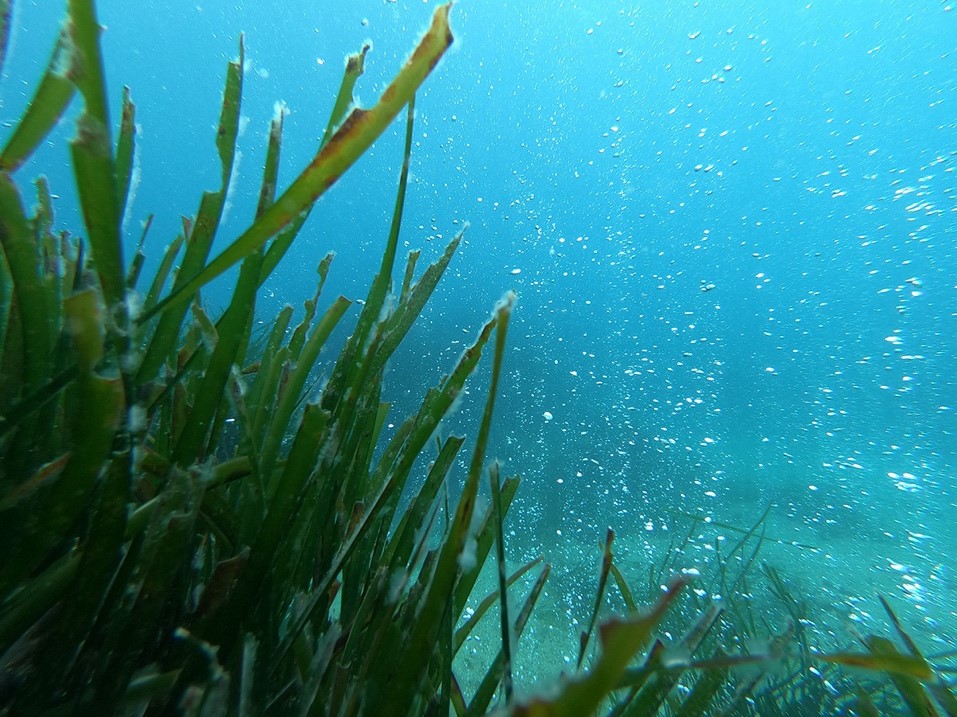A team from the Stazione Zoologica Anton Dohrn, led by researcher Ulisse Cardini from the Department of Integrative Marine Ecology, has published a new scientific study exploring the role of symbioses between marine plants and their microscopic partners, and how ocean acidification affects their nutrition
 Seagrass beds are biodiversity-rich ecosystems, similar to underwater gardens, that are vital to the life of the oceans and marine creatures. However, they are now facing a growing threat: ocean acidification. This is caused by the excessive dissolution of carbon dioxide, which is mainly produced by human activities.
Seagrass beds are biodiversity-rich ecosystems, similar to underwater gardens, that are vital to the life of the oceans and marine creatures. However, they are now facing a growing threat: ocean acidification. This is caused by the excessive dissolution of carbon dioxide, which is mainly produced by human activities.
To better understand the impact of such acidification on the nutrition of marine plants, an innovative study has focused on the Mediterranean seagrass Posidonia oceanica and the role of its microscopic symbionts. Scientists used carbon dioxide emissions from volcanic activity near the island of Ischia, Italy, to study this plant and its symbionts under acidic conditions not far from those predicted for the future of the oceans.
Dr Ulisse Cardini from the Stazione Zoologica Anton Dohrn at the Genoa Marine Centre led this important work in collaboration with researchers from the University of Bremen in Germany, the Institute for Biological Resources and Marine Biotechnology - CNR Ancona, the University of Aarhus in Denmark, and the University of Southern Bohemia in the Czech Republic.
The researchers made a surprising discovery: despite the rising acidity levels, Posidonia meadows demonstrate remarkable resilience in the nitrogen cycle, which is crucial for their growth. The leaves of these seagrasses have become highly effective powerhouses for nitrogen transformation, involving a wide range of symbiotic microorganisms, including bacteria and archaea.
Even more interesting, comments Dr Ulisse Cardini, was the observation that, despite the increasing acidity, these microorganisms not only remain active but also accelerate many crucial processes. Marine plants benefit from the increase in carbon dioxide for photosynthesis and sugar production, while the microorganisms promote protein synthesis through increased nitrogen acquisition.
However, Dr Cardini further explains, this nutritional advantage is not without risk, as it can increase the risk of predation by herbivores and other organisms. This delicate balance highlights the importance of studying the processes that regulate the health and resilience of marine ecosystems in detail.
In conclusion, this study offers valuable insights into how marine plants and their microbes adapt to ocean acidification. It highlights the significance of safeguarding these ecosystems, which are vital for mitigating climate change and conserving ocean life for future generations.
Team Stazione Zoologica Anton Dohrn
Ulisse Cardini (EMI), Johanna Berlinghof (EMI e Università di Brema), Luis Montilla (EMI), Friederike Peiffer (EMI), Ugo Marzocchi (EMI e Università di Aarhus), Francesca Margiotta (RIMAR), Maria Abagnale (RIMAR)
Original publication
Johanna Berlinghof, Luis M. Montilla, Friederike Peiffer, Grazia M. Quero, Ugo Marzocchi, Travis B. Meador, Francesca Margiotta, Maria Abagnale, Christian Wild & Ulisse Cardini. Accelerated nitrogen cycling on Mediterranean seagrass leaves at volcanic CO2 vents. Communications Biology 7, 341 (2024). https://doi.org/10.1038/s42003-024-06011-0
Project funding
This research was supported by a Ph.D. fellowship co-funded by the Stazione Zoologica Anton Dohrn (SZN) and the University of Bremen (to J.B. and F.P.), a Ph.D. fellowship funded by the Open University – SZN Ph.D. Program (to L.M.M.), and a SZN postdoctoral fellowship (to U.M.). U.C. was partially supported by the Italian PRIN 2022 project ENGAGE (grant n. 20223R4FJK) and PRIN 2022 PNRR project BORIS (grant n. P2022R739J), funded by the European Union – Next Generation EU.










